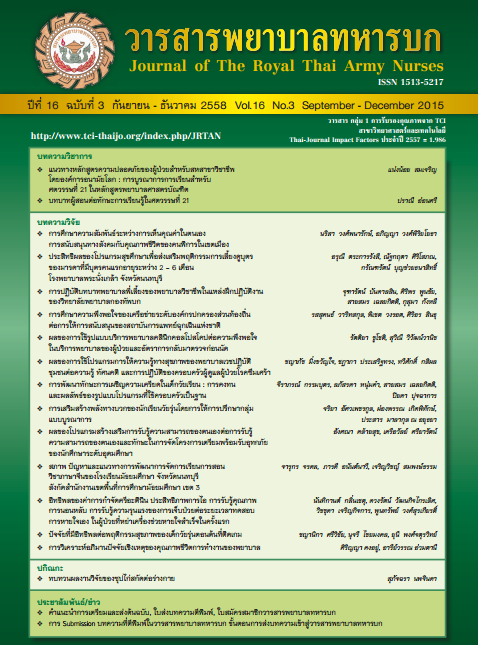อิทธิพลของค่าการกำจัดครีอะตินิน ประสิทธิภาพการไอ การรับรู้คุณภาพการนอนหลับ การรับรู้ความรุนแรงของการเจ็บป่วย ต่อระยะเวลาทดสอบการหายใจเองในผู้ป่วยที่หย่าเครื่องช่วยหายใจสำเร็จในครั้งแรก
Keywords:
ระยะเวลาทดสอบการหายใจเอง, ค่าการกำจัดครีอะตินิน, ประสิทธิภาพการไอ, การรับรู้คุณภาพการนอนหลับ, duration of spontaneous breathing trial, creatinine clearance, cough effectiveness, perceived sleep quality, perceived severity of illnessAbstract
การวิจัยความสัมพันธ์เชิงทำนายนี้ มีวัตถุประสงค์เพื่อศึกษาอิทธิพลของค่าการกำจัดครีอะตินิน ประสิทธิภาพการไอ การรับรู้คุณภาพการนอนหลับ และการรับรู้ความรุนแรงของการเจ็บป่วยต่อระยะเวลาทดสอบการหายใจเอง ในผู้ป่วยที่หย่าเครื่องช่วยหายใจสำเร็จในครั้งแรก กลุ่มตัวอย่างจำนวน 100 ราย เก็บรวบรวมข้อมูลโดยใช้แบบบันทึกข้อมูลพื้นฐานของผู้ป่วยแบบบันทึกค่าการกำจัดครีอะตินิน ประสิทธิภาพการไอ การรับรู้คุณภาพการนอนหลับ และการรับรู้ความรุนแรงของการเจ็บป่วย วิเคราะห์ข้อมูลโดยใช้สถิติเชิงพรรณนา และการวิเคราะห์ถดถอยเชิงเส้นแบบพหุคูณ ผลการศึกษาพบว่ากลุ่มตัวอย่างเป็นเพศชายร้อยละ 57 มีอายุเฉลี่ย 72.06 ปี (S.D. = 15.64) ค่าเฉลี่ยระยะเวลาทดสอบการหายใจเองจนกระทั่งถอดท่อช่วยหายใจสำเร็จเฉลี่ย 96.55 นาที (S.D. = 25.42) ค่าการกำจัดครีอะตินิน ประสิทธิภาพการไอ การรับรู้คุณภาพการนอนหลับ และการรับรู้ความรุนแรงของการเจ็บป่วยร่วมกันทำนายระยะเวลาทดสอบการหายใจเองได้ร้อยละ 37.2 (R2 = .372, p < .001) โดยการรับรู้ความรุนแรงของการเจ็บป่วย และการรับรู้คุณภาพการนอนหลับ ทำนายระยะเวลาทดสอบการหายใจเองอย่างมีนัยสำคัญทางสถิติ ( β = .353, p < .01; β = -.265, p < .01 ตามลำดับ) ดังนั้นพยาบาลควรส่งเสริมคุณภาพการนอนหลับ ให้ข้อมูลความรุนแรงของการเจ็บป่วย และความพร้อมของผู้ป่วยในการหย่าเครื่องช่วยหายใจ เพื่อให้ผู้ป่วยมีความมั่นใจในการฝึกหายใจเอง ซึ่งจะส่งเสริมให้หย่าเครื่องช่วยหายใจสำเร็จได้เร็วขึ้น
This correlational predictive study aimed to examine the influence of creatinine clearance, cough effectiveness, perceived sleep quality and perceived severity of illness on duration of spontaneous breathing trial in patients with simple ventilator weaning. The sample consisted of 100 patients. The data were collected by using a demographic questionnaire, a creatinine clearance record, a cough effectiveness record, a perceived sleep quality scale and a perceived severity of illness scale. The data were analyzed by using descriptive statistics and multiple regression analysis. The results revealed that more than half of the participants (57%) were male, with an average age of 72.06 years (S.D. = 15.64). The average duration of spontaneous breathing trial was 96.55 minutes (S.D. = 25.42). Creatinine clearance, cough effectiveness, perceived sleep quality and perceived severity of illness jointly predicted the duration of spontaneous breathing trial for 37.2% (R2 = .372, p < .001). Perceived severity of illness and perceived sleep quality significantly predicted duration of spontaneous breathing trial (β = .353, p < .01; β = -.265, p < .01, respectively). Based on the findings, it is suggested that nurses should promote sleep quality, provide information about severity of illness and weaning readiness which could encourage readiness and confidence in spontaneous breathing trial. This would decrease weaning time.
Downloads
Downloads
How to Cite
Issue
Section
License
บทความหรือข้อคิดเห็นใดใดที่ปรากฏในวารสารพยาบาลทหารบกเป็นวรรณกรรมของผู้เขียน ซึ่งบรรณาธิการหรือสมาคมพยาบาลทหารบก ไม่จำเป็นต้องเห็นด้วย
บทความที่ได้รับการตีพิมพ์เป็นลิขสิทธิ์ของวารสารพยาบาลทหารบก
The ideas and opinions expressed in the Journal of The Royal Thai Army Nurses are those of the authors and not necessarily those
of the editor or Royal Thai Army Nurses Association.






